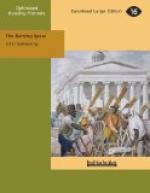“Here’s another coupon—and anything else you’ve got.”
Mr. Lavender, whose pangs had leaped in him at the word “beef,” gazed at the bare bone of the beef-joint, and sighed.
“I, too, will have some ham and a couple of poached eggs,” he said.
“You can have ham, sir,” replied the maid, “but there are only eggs enough for one.”
“And I am the one,” said the young man, looking up for the first time.
Mr. Lavender at once conceived an aversion from him; his appearance was unhealthy, and his eyes ravened from behind the spectacles beneath his high forehead.
“I have no wish to deprive you of your eggs, sir,” he said, “though I have had nothing to eat all day.”
“I have had nothing to eat to speak of for six months,” replied the young man, “and in a fortnight’s time I shall have nothing to eat again for two years.”
Mr. Lavender, who habitually spoke, the truth, looked at him with a sort of horror. But the young man had again concentrated his attention on his plate. “How deceptive are appearances,” thought Mr. Lavender; “one would say an intellectual, not to say a spiritual type, and yet he eats like a savage, and lies like a trooper!” And the pinchings of his hunger again attacking him, he said rather acidly:
May I ask you, sir, whether you consider it amusing to tell such untruths to a stranger?
The young man, who had finished what was on his plate, paused, and with a faint smile said:
“I spoke figuratively. You, sir, I expect, have never been in prison.”
At the word ‘prison’ Mr. Lavender’s natural kindliness reasserted itself at once. “Forgive me,” he said gently; “please eat all the ham. I can easily do with bread and cheese. I am extremely sorry you have had that misfortune, and would on no account do anything which might encourage you to incur it again. If it is a question of money or anything of that sort,” he went on timidly, “please command me. I abhor prisons; I consider them inhuman; people should only be confined upon their honours.”
The young man’s eyes kindled behind his spectacles.
“I have been confined,” he said, “not upon my honour, but because of my honour; to break it in.”
“How is that?” cried Mr. Lavender, aghast, “to break it in?”
“Yes,” said the young man, cutting a large slice of bread, “there’s no other way of putting it with truth. They want me to go back on my word to go back on my faith, and I won’t. In a fortnight’s time they’ll gaol me again, so I must eat—excuse me. I shall want all my strength.” And he filled his mouth too full to go on speaking.
Mr. Lavender stared at him, greatly perturbed.
“How unjustly I judged him,” he thought; and seeing that the maid had placed the end of a ham before him he began carving off what little there was left on it, and, filling a plate, placed it before the young man. The latter thanked him, and without looking up ate rapidly on. Mr. Lavender watched him with beaming eyes. “It’s lovely to see him!” he thought; “poor fellow!”




